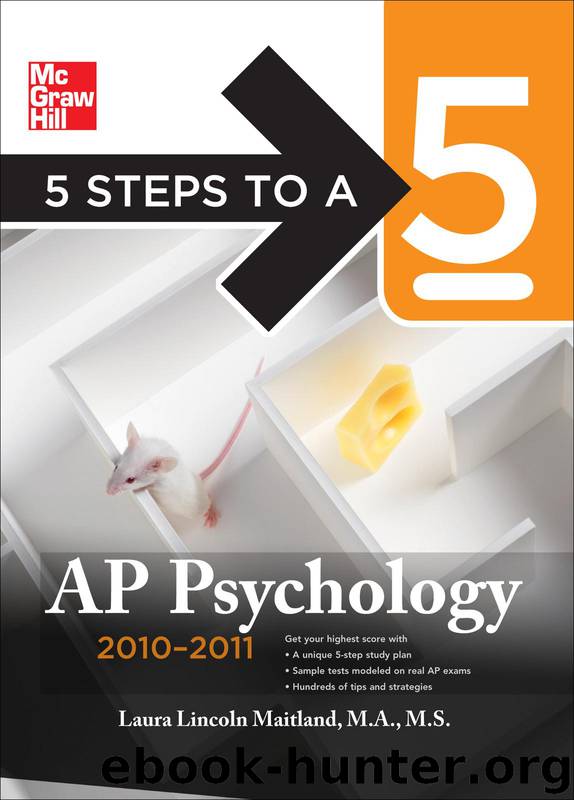5 Steps to a 5 AP Psychology, 2010-2011 Edition by Laura Lincoln Maitland

Author:Laura Lincoln Maitland
Language: eng
Format: mobi, epub
Tags: Examinations, Psychology, Reference, Education & Training, Advanced Placement Programs (Education), General, Tests, Etc, Psychology - Examinations, Questions, Foreign Language Study, Advanced Placement, Study Guides, College Entrance Achievement Tests, Study Aids
ISBN: 9780071624534
Publisher: McGraw-Hill
Published: 2009-11-11T00:00:00+00:00
stage 2—further self-interests, gain reward
• Conventional level—when at the concrete operational stage of cognitive development or formal operational stage for most people
stage 3—conform, live up to expectations of others
stage 4—maintain law and order, do your duty
• Postconventional level—reached by only some people in the formal operational stage
stage 5—social contract, to promote the society’s welfare
stage 6—to promote justice
Carol Gilligan criticized Kohlberg’s study because it focused on males, and women rarely reach Kohlberg’s highest stage. She said women follow an ethic of care, rather than justice.
Social development:
Social development looks at the influence of others on the development of a person.
Culture—behaviors, ideas, attitudes, and traditions transmitted from one generation to the next within a group of people who share a common language and environment.
Bonding—creation of close emotional relationship between mother (or parents) and baby shortly after birth.
Attachment—a close emotional bond or relationship between the infant and the caregiver.
Harry Harlow found monkeys separated from their mothers sought comfort from a soft cloth-covered substitute (surrogate) rather than a bare wire substitute with a feeding bottle, showing attachment isn’t based on feeding.
Mary Ainsworth’s “strange situation” research categorized type of attachment based on how baby reacted to, and after, temporary absence of mother:
Secure attachment—after absence baby is happy to see mother, receptive to her contact.
Insecure attachment—after absence baby is angry and rejecting of mother, avoids her, ignores her, or behaves inconsistently.
Securely attached babies tend to become socially competent children.
Temperament—an infant’s natural disposition to show a particular mood at a particular intensity for a specific period.
• Easy babies—cheerful, relaxed; follow predictable patterns of eating and sleeping.
• Difficult babies—irritable, intense, unpredictable.
In general, easy babies tend to become sociable children, and difficult babies less sociable.
Self-awareness—consciousness of oneself as a person.
Social referencing—observing the behavior of others in social situations to obtain information or guidance.
Diana Baumrind identified four parenting styles that affect emotional growth of children:
Authoritarian parenting style—sets up absolute and restrictive rules accompanied by punishment for disobedience.
Authoritative parenting style—focuses on flexible rules for which reasons are generally given. Parents are warm and nurture independence within guidelines.
Permissive parenting style—sets no firm guidelines for behavior and tends to give in to demands of the child.
Uninvolved parenting style—makes few demands, shows low responsiveness and little communication.
For individualistic cultures, the most self-reliant, socially competent children with the highest self-esteem tend to have warm, authoritative parents.
Erik Erikson’s Theory of Psychosocial Development looks at development across the life span in a social context in 8 sequential stages during which we are faced with a crisis to resolve:
Table 13.1 Erik Erikson’s Theory of Psychosocial Development
Download
5 Steps to a 5 AP Psychology, 2010-2011 Edition by Laura Lincoln Maitland.epub
This site does not store any files on its server. We only index and link to content provided by other sites. Please contact the content providers to delete copyright contents if any and email us, we'll remove relevant links or contents immediately.
Pale Blue Dot by Carl Sagan(5008)
Cracking the GRE Premium Edition with 6 Practice Tests, 2015 (Graduate School Test Preparation) by Princeton Review(4293)
Pocahontas by Joseph Bruchac(4259)
Unfiltered by Lily Collins(4004)
The Emotionary: A Dictionary of Words That Don't Exist for Feelings That Do by Eden Sher(3365)
The Daily Stoic by Holiday Ryan & Hanselman Stephen(3322)
The 48 laws of power by Robert Greene & Joost Elffers(3291)
Factfulness_Ten Reasons We're Wrong About the World_and Why Things Are Better Than You Think by Hans Rosling(3237)
The Innovators: How a Group of Hackers, Geniuses, and Geeks Created the Digital Revolution by Walter Isaacson(3209)
The President Has Been Shot!": The Assassination of John F. Kennedy by Swanson James L(3102)
Sapiens and Homo Deus by Yuval Noah Harari(3071)
Rogue Trader by Leeson Nick(3044)
Gettysburg by Iain C. Martin(2835)
The Rape Of Nanking by Iris Chang(2824)
Almost Adulting by Arden Rose(2709)
The Plant Paradox by Dr. Steven R. Gundry M.D(2621)
In the Woods by Tana French(2599)
500 Must-Know AP Microeconomics/Macroeconomics Questions(2572)
Make by Mike Westerfield(2321)
